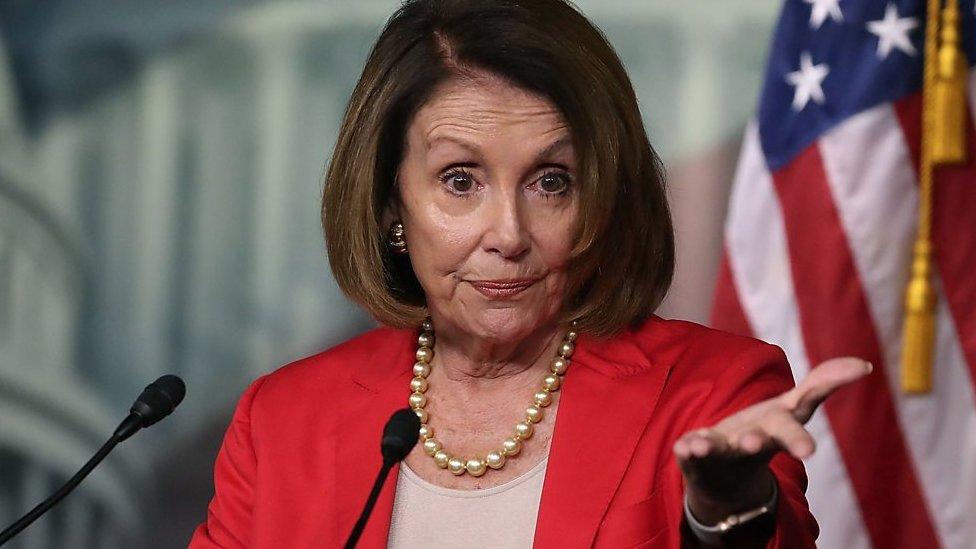Donald Trump: UK is losing the 'anchor round its ankle'
- Published
The G7 leaders and some of their spouses posed for a "family photo" after a day of talks
President Trump has promised a "very big trade deal" with the UK, saying its departure from the EU will be like losing "an anchor round the ankle".
Mr Trump was speaking after a breakfast meeting with Mr Johnson at the G7 summit in Biarritz in France.
But Mr Johnson said the US must open up its markets if a post-Brexit trade deal is to be agreed.
"I don't think we sell a single joint of British lamb in the United States, we don't sell any beef," the PM said.
Mr Johnson's breakfast meeting came before a day of discussions with other world leaders at the summit.
The PM also met European Council President Donald Tusk, a day after the two men clashed over who would be held responsible for a no-deal Brexit.
President Trump said Boris Johnson was the "right man" to deliver Brexit
Speaking to reporters after the working breakfast, Mr Trump said a deal with the UK would happen "quickly".
"We're going to do a very big trade deal, bigger than we've ever had with the UK," he said.
"And now at some point they won't have the obstacle, they won't have the anchor around their ankle, because that's what they have."
Mr Johnson told Mr Trump: "Talking of the anchor, Donald, what we want is for our ships to take freight, say, from New York to Boston, which for the moment they're not able to do."
In a later interview with the BBC, Mr Johnson said agreeing any trade deals with the US within a year "would be tight".
"My own experience of the way Americans work, the size and complexity of the deal we want to do probably means we won't be able to do within a year.
When asked if it could take five years, he replied: "No, we'll do it faster than that.
"We need to do it fast, but to get the whole thing done from soup to nuts within a year is going to be a big ask."
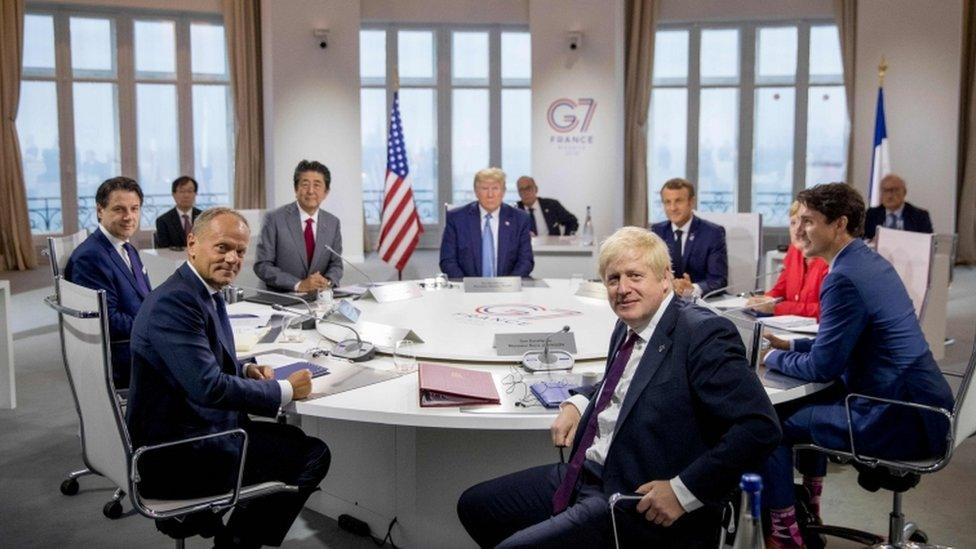
Prime Minister Boris Johnson met with leaders at the annual G7 summit on Sunday
Before his talks with the US President, Mr Johnson spoke about "massive opportunities for the UK to prise open the American market".
As a member of the European Union, the UK cannot make its own trade deals with other countries - and the EU does not have a free trade deal with the US.
The UK has already agreed 13 "continuity" deals with 38 countries that will apply post-Brexit.
Offering an example of an American trade restriction, Mr Johnson said: "Melton Mowbray pork pies, which are sold in Thailand and in Iceland, are currently unable to enter the US market because of, I don't know, some sort of food and drug administration restriction."
He continued: "UK bell peppers cannot get into the US market at all.
"Wine shipments are heavily restricted. If you want to export wine made in England to the US you have to go through a US distributor.
"There is a tax on British micro-breweries in the US that doesn't apply to US micro-breweries in the UK."
The government added that tariffs on some UK goods in the US can reach up to 28% for fashion, 15% for machinery and 35% for food and drink.
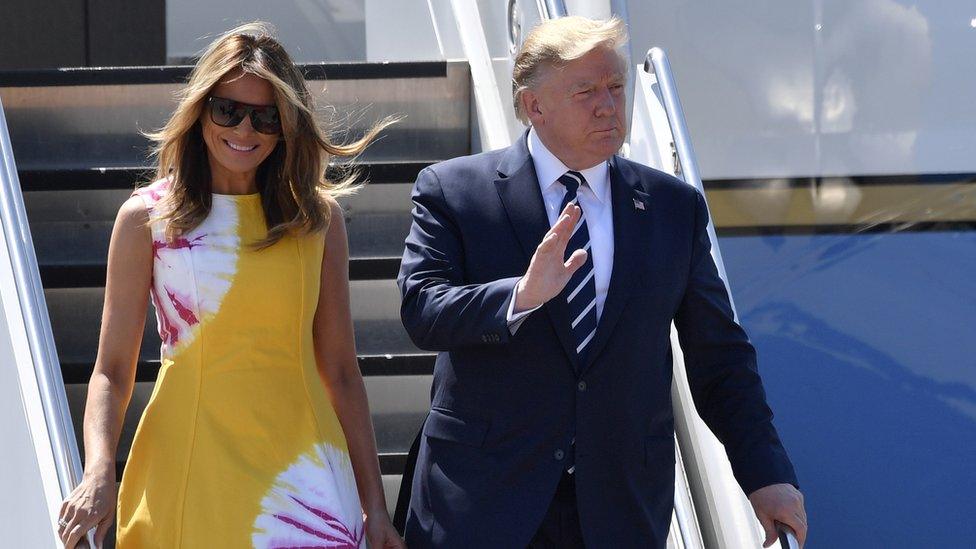
Donald and Melania Trump arrived in France for the G7 summit on Saturday
David Henig, the UK director of the European Centre For International Political Economy, said the US "would be loathe" to get rid of the barriers intended to protect US producers.
He added: "The US is quite protectionist - the US have never done a trade deal the likes of which Mr Johnson is describing.
"The question is whether the US is prepared to give the UK something and what we would have to give them in return.
"It is less clear what Trump wants in terms of trade altogether."
In June, Mr Trump made comments that the NHS "was on the table" in US-UK trade deal - but later rowed back on his remarks.
At the G7 summit Mr Johnson was asked if he had made it clear the NHS was not on the table.
He replied: "Not only have I made clear of that, the president has made that very, very clear. There is complete unanimity on that point."

What is a trade deal?
Trade deals involve two or more countries agreeing a set of terms by which they buy and sell goods and services from each other.
Deals are designed to increase trade by eliminating or reducing trade barriers. These barriers might include import or export taxes (tariffs), quotas, or differing regulations on things such as safety or labelling.

Last month, President Trump said talks about a "very substantial" trade deal with the UK were already under way.
He said a bilateral post-Brexit deal could lead to a "three to four, five times" increase in current trade - but provided no details about how that would be achieved.
However, the Speaker of the US House of Representatives, Nancy Pelosi, said a UK-US trade deal would not get through Congress if Brexit undermined the Good Friday Agreement.
Ms Pelosi said the UK's exit from the EU could not be allowed to endanger the 1998 Irish peace deal, which the US helped facilitate.
- Published24 August 2019
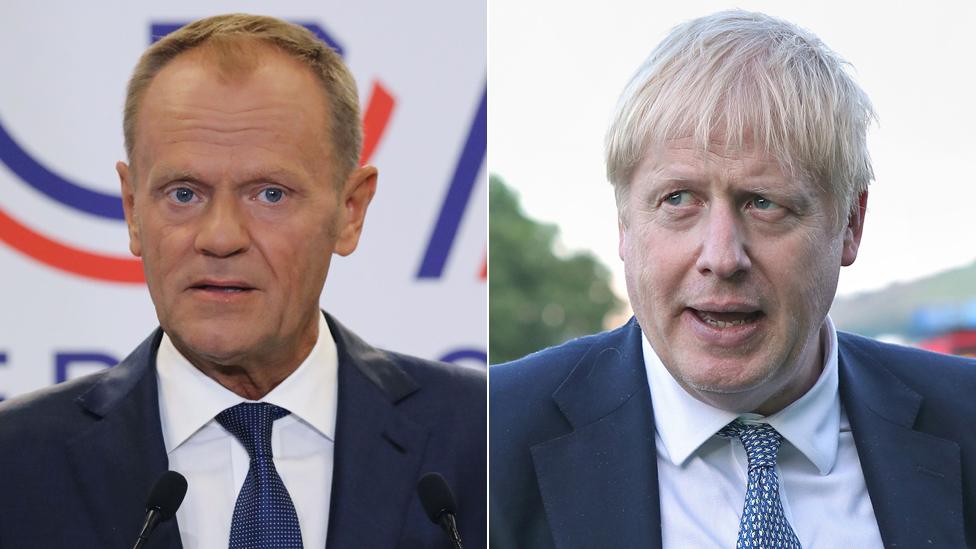
- Published27 July 2019
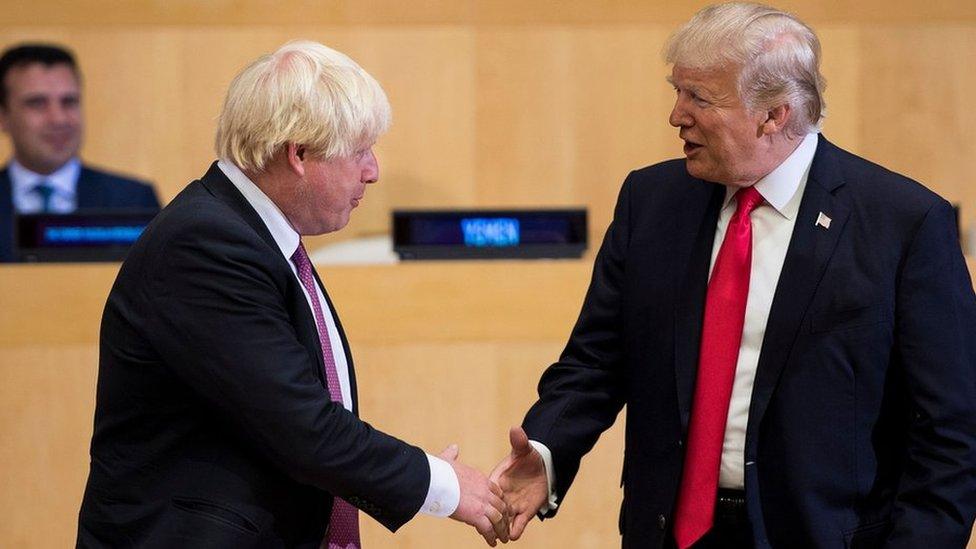
- Published14 August 2019
